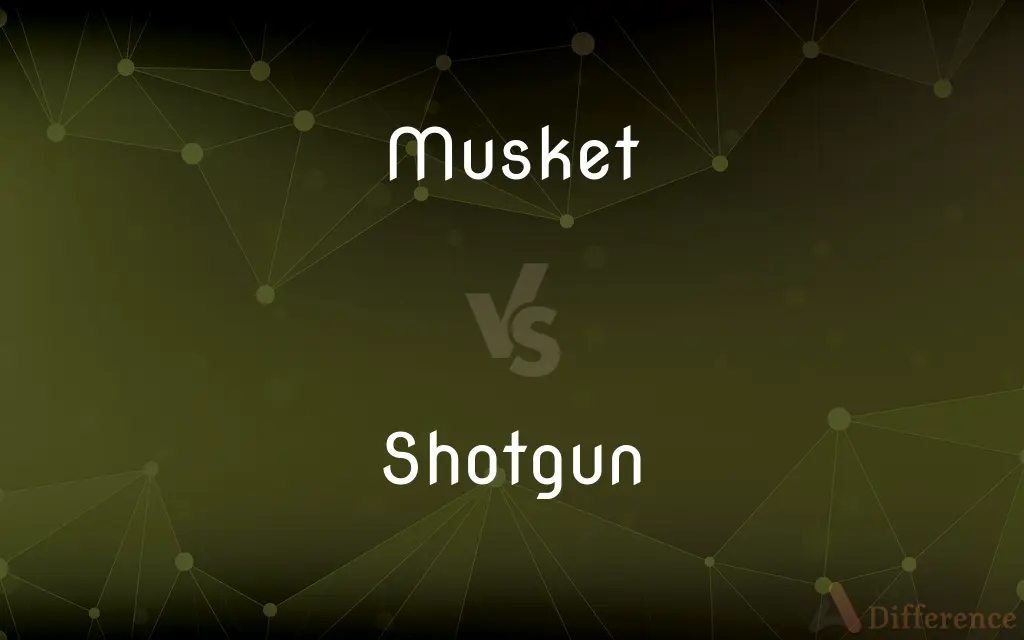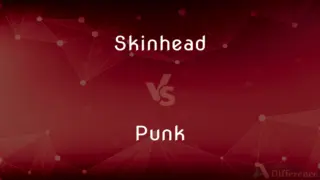Musket vs. Shotgun — What's the Difference?
By Fiza Rafique & Maham Liaqat — Updated on March 12, 2024
A musket is an early long gun from the 16th to 19th centuries, used mainly in warfare, while a shotgun is a modern firearm designed to fire a spread of shot or a single slug.

Difference Between Musket and Shotgun
Table of Contents
ADVERTISEMENT
Key Differences
Muskets, prevalent from the 16th to the early 19th centuries, were smoothbore firearms, often requiring a stand to aim and fire due to their size and weight. Shotguns, in contrast, are versatile firearms used in various settings, from hunting to sports shooting, capable of firing multiple small projectiles (shot) or a single solid projectile (slug).
The musket was a primary infantry weapon before the advent of rifled barrels, characterized by a slower reload time due to its muzzle-loading mechanism. Shotguns, however, can be either breech or muzzle-loaded, with modern varieties featuring mechanisms like pump-action, semi-automatic, and break-action, allowing for quicker reloads and successive shots.
Accuracy and range differentiate these firearms significantly; muskets, with their longer barrels and heavier projectiles, were effective at longer distances despite their inaccuracy by today's standards. Shotguns are designed for shorter ranges, excelling in hitting moving targets due to the spread of shot, although rifled shotguns and slugs can achieve reasonable accuracy over greater distances.
The ammunition used also sets these firearms apart; muskets were typically loaded with a single lead ball and gunpowder, while shotguns use cartridges filled with shot (small pellets) or slugs, providing versatility in hunting different game sizes and in various sporting contexts.
Historically, muskets played a crucial role in the formation of modern armies and tactics, especially in line infantry formations. Shotguns have found a broader range of uses, from military and law enforcement to recreational hunting and sports shooting, highlighting their adaptability to different purposes beyond warfare.
ADVERTISEMENT
Comparison Chart
Era
16th to early 19th century
Modern, with historical roots
Primary Use
Military warfare
Hunting, sports, law enforcement
Loading Mechanism
Muzzle-loaded
Breech or muzzle-loaded, various actions
Ammunition
Single lead ball, gunpowder
Shot (pellets) or slugs
Barrel Type
Smoothbore
Smoothbore or rifled
Effective Range
Longer, but less accurate
Shorter, designed for spread or targeted shot
Reload Time
Slower, manual muzzle-loading
Quicker, with modern loading mechanisms
Historical Role
Formation of modern armies, line infantry
Versatile, used in various fields beyond warfare
Accuracy
Lower due to lack of rifling
Higher with modern technology, especially rifled barrels
Versatility
Primarily for combat
Broad, including hunting and sport
Compare with Definitions
Musket
An early smoothbore long gun used in warfare.
Musketeers were crucial infantry units in 17th-century battles.
Shotgun
A firearm designed to fire a spread of shot or a single slug.
Shotguns are preferred for bird hunting due to their shot spread.
Musket
Characterized by muzzle-loading with a lead ball.
Reloading a musket in battle required skill and calm under pressure.
Shotgun
Versatile in use, from hunting to law enforcement.
SWAT teams often use shotguns for their stopping power in close quarters.
Musket
Known for its use in line infantry tactics.
The Redcoats' musket volleys were a defining feature of British military tactics.
Shotgun
Available with smoothbore or rifled barrels.
Rifled shotguns are used for slug shooting, offering better accuracy.
Musket
Less accurate but effective in massed fire.
Musket balls were notorious for their inaccuracy over long distances.
Shotgun
Utilizes cartridges for quick reloading.
Modern shotguns with pump-action mechanisms allow for rapid successive shots.
Musket
Predominantly replaced by rifled firearms.
The introduction of the rifle marked the end of the musket era in warfare.
Shotgun
Integral to various shooting sports and competitions.
Skeet shooting is a popular sport that showcases shotgun accuracy and speed.
Musket
A musket is a muzzle-loaded long gun that appeared as a smoothbore weapon in the early 16th century, at first as a heavier variant of the arquebus, capable of penetrating heavy armor. By the mid-16th century, this type of musket went out of use as heavy armor declined, but the term musket continued as the name given for any hand held long gun until the mid-19th century.
Shotgun
A shotgun (also known as a scattergun, or historically as a fowling piece) is a long-barreled firearm designed to shoot a straight-walled cartridge known as a shotshell, which usually discharges numerous small pellet-like spherical sub-projectiles called shot, or sometimes a single solid projectile called a slug. Shotguns are most commonly smoothbore firearms, meaning that their gun barrels have no rifling on the inner wall, but rifled barrels for shooting slugs (slug barrels) are also available.
Musket
A smoothbore shoulder gun used from the late 1500s through the early 1800s.
Shotgun
A smooth-bore gun for firing small shot at short range.
Musket
A kind of firearm formerly carried by the infantry of an army, originally fired by means of a match, or matchlock, for which several mechanical appliances (including the flintlock, and finally the percussion lock) were successively substituted; ultimately superseded by the rifle.
Soldier, soldier, won't you marry me, with your musket, fife and drum.
Sam, Sam, pick up thy musket.
Shotgun
The front passenger seat in a vehicle
I took the shotgun seat
Musket
(falconry) A male Eurasian sparrowhawk (Accipiter nisus).
Shotgun
Aimed at a wide range of things; having no specific target
Many companies use the shotgun approach, aiming advertising at the widest possible audience
Musket
The male of the sparrow hawk.
Shotgun
Denoting a long, narrow single-storey house whose rooms are arranged one behind another
His family lived in a shotgun shack in South Memphis
Musket
A species of firearm formerly carried by the infantry of an army. It was originally fired by means of a match, or matchlock, for which several mechanical appliances (including the flintlock, and finally the percussion lock) were successively substituted. This arm has been completely superseded by the rifle, and is now only of historical interest.
Shotgun
Consume (a canned drink) in one go by puncturing the can, putting one’s mouth over the resulting hole, and then opening the can by means of the ring pull to produce a rapid flow
A group of us shotgunned beers
Musket
A muzzle-loading shoulder gun with a long barrel; formerly used by infantrymen
Shotgun
A smoothbore gun that fires shot over short ranges. Also called scattergun.
Shotgun
(Football) An offensive formation, used especially for passing, in which the quarterback receives the snap several yards behind the line of scrimmage.
Shotgun
Of, relating to, or using a shotgun.
Shotgun
Obtained by or involving coercion
A shotgun compromise.
Shotgun
Covering a wide range in a haphazard or ineffective manner
Shotgun methods of testing the hypothesis that wasted time and money.
Shotgun
Having the rooms joined in a line from front to back
A shotgun house, a shotgun apartment.
Shotgun
To shoot at with a shotgun.
Shotgun
To drink (a can of beer or other beverage) quickly through a hole punched near the bottom of the can.
Shotgun
Used to claim the front passenger seat of a vehicle before a trip has started.
Shotgun
(slang) The front passenger seat in a vehicle, next to the driver; so called because the position of the shotgun-armed guard on a horse-drawn stage-coach, wagon train, or gold transport was next to the driver on a forward-mounted bench seat. Can also be used in situations of claiming other resources such as bedrooms.
Shotgun
A one-story dwelling with no hallways or corridors, with the rooms arranged in a straight line.
Elvis Presley was born in a two-bedroom shotgun in Tupelo, Mississippi.
Shotgun
(American football) An offensive formation in which the quarterback receives the snap at a distance behind the center, often with a running back set to one or both sides of him.
Shotgun
Relating to shotguns, either in a present or past sense.
Shotgun cartridges
Shotgun seat
Shotgun
Relating to the threat of force or dubious means.
Shotgun wedding
Shotgun diplomacy
Shotgun
Relating to the use of numerous, diverse or indiscriminate means to achieve a particular result.
Shotgun marketing
Shotgun approach
Shotgun
To inhale from a pipe or other smoking device, followed shortly by an exhalation into someone else’s mouth.
Shotgun
To verbally lay claim to (something)
I got a day off because I shotgunned it.
Shotgun
To hit the ball directly back at the pitcher.
Shotgun
To rapidly drink a beverage from a can by making a hole in the bottom of the can, placing the hole above one's mouth, and opening the top.
Shotgun
To send out many (requests, answers to a question, etc), especially in the hope that one obtains a positive result (i.e. reveals useful information, is correct, etc), in the manner of a shotgun firing many balls of shot such that one may hit a target.
Shotgun
To employ the technique of shotgun debugging.
Shotgun
Firearm that is a double-barreled smoothbore shoulder weapon for firing shot at short ranges
Common Curiosities
What is a musket?
A musket is an early firearm used primarily in military conflicts from the 16th to the early 19th centuries, known for its smoothbore barrel and muzzle-loading mechanism.
How is a shotgun different from a musket?
A shotgun is a modern firearm that can fire multiple small projectiles (shot) or a single slug, and it comes with various loading mechanisms, making it more versatile than a musket.
How quickly could a skilled soldier reload a musket?
A skilled soldier could reload a musket in 15 to 20 seconds under optimal conditions.
Can shotguns be used for purposes other than hunting?
Yes, shotguns are used in sports shooting, law enforcement, and military applications due to their versatility and stopping power.
Are all shotguns smoothbore?
While many shotguns are smoothbore to allow for the spread of shot, some shotguns have rifled barrels for shooting slugs with greater accuracy.
Were muskets used in naval warfare?
Yes, muskets were also used in naval engagements, both as personal arms and in boarding actions.
What advancements led to the decline of the musket?
The development of rifling, breech-loading mechanisms, and cartridge ammunition contributed to the obsolescence of the musket.
Why did militaries stop using muskets?
Muskets were gradually replaced by rifles and other firearms that offered greater accuracy, faster reload times, and more effective range.
What makes a shotgun effective for hunting birds?
The spread of shot from a shotgun increases the likelihood of hitting a moving target like a bird, making it ideal for bird hunting.
What was the typical effective range of a musket?
Muskets had an effective range of about 100 yards, although their accuracy significantly decreased over distance.
How does the spread of shot work in a shotgun?
When fired, the shot (small pellets) spreads out, increasing the hit area, which is particularly useful for moving targets or in close combat.
Can a shotgun be customized for different uses?
Yes, shotguns can be customized with different barrel lengths, chokes, and sights for various purposes, from hunting to tactical applications.
How did musket warfare affect battlefield tactics?
Musket warfare led to the development of line infantry tactics, where soldiers fired in volleys to maximize the effectiveness of their inaccurate weapons.
Do modern militaries still use shotguns?
Yes, modern militaries and law enforcement agencies use shotguns for their versatility and effectiveness in close combat situations.
What is the historical significance of the musket?
Muskets played a crucial role in the development of modern military tactics and the formation of standing armies during their time of use.
Share Your Discovery

Previous Comparison
Serviceable vs. Usable
Next Comparison
Skinhead vs. PunkAuthor Spotlight
Written by
Fiza RafiqueFiza Rafique is a skilled content writer at AskDifference.com, where she meticulously refines and enhances written pieces. Drawing from her vast editorial expertise, Fiza ensures clarity, accuracy, and precision in every article. Passionate about language, she continually seeks to elevate the quality of content for readers worldwide.
Co-written by
Maham Liaqat















































